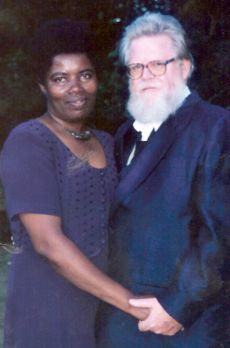|
English
Français
Português

|
Esta página requiere ser traducida al Español
Tu ayuda y retroalimentación son bienvenidos.
Por favor consulta la página del Equipo de Traducción.
|

|
WikiEds are around the world; always someone is awake
Mi perfil
OER
My Sandbox
Featured L4C Participant

Phil's Rants
Traducido por Cristina Varela
Mis pensamientos ocasionales sobre el WikiEducador y su comunidad
- Necesitamos volvernos más cuidadosos con la palabra “competente”. Existen ciertas organizaciones que simplemente no deberían ser gestionadas como negocios. Entre ellas, las organizaciones gubernamentales o religiosas, las familias y, como en el caso que nos ocupa, las organizaciones educativas. Sin pensarlo, en nuestra vida diaria pensamos que ser “competente” es lo mismo que ser prudente en los gastos, eficiente en la distribución de recursos y preciso en la contabilidad. Deberíamos serlo. Pero el término en cuestión tiene más implicaciones que necesitamos estudiar cuidadosamente. Una empresa con responsabilidad limitada es una persona legal, y ciertos psicólogos has descrito a esta persona como una bestia psicótica. Esto es así porque la ley apoya el objetivo de que una empresa tiene una sola ética, que es generar beneficios. No tiene obligación social alguna. Cada vez más, a las instituciones educativas se les está diciendo que sean “autosuficientes”, y menos dependientes de los fondos públicos. El resultado de esto está siendo la “comodificación” de la educación. Los cerificados y los títulos se están poniendo a la venta. Los estándares están bajado. El crecimiento de los valores de la propiedad intelectual, si bien es importante, es solamente uno de los elementos en este proceso, que solamente puede tener resultados desastrosos. El movimiento creciente del copyright abierto y compartido se está contrarrestando notablemente esta situación.--Phil Bartle 05:54, 13 June 2009 (UTC)
- Back in the late sixties, early seventies, as a recently returned overseas volunteer, I linked up with a group of returned volunteers. Some of us called us radical, and I suppose we were unorthodox at least. We wanted to raise awareness that aid was ineffective, that honest trade relations were needed, and that the world could be improved. At that time, University of California, Berkeley, Political Science Club, created a simulation game, effective for about thirty persons, called Starpower. It was good for illustrating inequality such as Apartheid, global inequality, or social class. We went around to schools and churches and ran the game with what we thought was great effect. It came to us as a cyclostyled single sheet of instructions, and we made our own tokens and ID tags. It belonged to the public domain. A few years ago, as I was developing the Community Empowerment site, I added a description of Starpower to the Inequality section. I found out that the game had been copyrighted by a commercial corporation, So I wrote to them saying I had the description and was getting it translated into various languages. It might raise their profile. I got a nasty letter from their lawyer telling me to stop writing about it, They owned the copyright, and did not want us writing about it. I was shocked. Being the defiant rebel that I am, I decided to write a sociological academic analysis, but made sure it included sufficient description of the details of the game that anybody could make their own tokens and coupons and run the game for free. That would save them over two hundred dollars of the purchase price. The whole incident left a sour taste in my mouth, and is a big factor in my now being an advocate of the cc by sa approach. --Phil Bartle 15:31, 10 June 2009 (UTC)
- Happy to hear that Sweden elected one seat to the Pirate Party in the European Parliament this weekend. The Pirate Party is opposed to the current spread of copyright, especially for non commercial ideas (Culture and Knowledge). --Phil Bartle 14:10, 8 June 2009 (UTC)
- As educational institutions are becoming more and more like corporations, thus less and less like educational institutions, as education becomes commodified, there is a growing confusion between the concepts of copyright and patent. Somehow the institutions want to keep copyright over new ideas created by their educators, like a corporation, in order to make a profit from them. So called "intellectual property." But there is no profit, only an ideological mind set. The CC by SA concept of the wikis, is a healthy counterbalance to that. Let ideas be free and open.--Phil Bartle 22:29, 6 June 2009 (UTC)
- Date: Wed, Jun 3 2009 2:11 am, From: Peter: When I first came across Phil s' work I couldn't help but have a big smile on my face. I like his tag line of "No rest for the WikiEd". I know of a saying "No rest for the wicked." I wonder how these two relate ;) As I further explored Phil's work I was encouraged by his works in making WikiEducator available in four languages (English, Spanish, Portuguese & French). He may not be doing the translation himself, yet he is making things happen. Also, take a look around all of Phil s' profile sub-pages so much great work in bring references and resources together. It is with great pleasure to award Phil Bartle the June 2009 featured user page. Congratulations, Phil.
- Date: Wed, Jun 3 2009 4:52 am. From: Phil Bartle Well it is certainly humbling to be named June's UPE. Thanks, Guys. The "No Rest for The WikiEd" came from something Nellie and Patricia were saying during an on line aural discussion, We are now so many around the world that somewhere some of us are awake. The real quote is from the Jewish - Christian bible, "No rest for the wicked," and if you want the citation, look at my user page in edit mode. I am not trying to compete for things, I am retired and enjoying the marvelous way to spend the time. I am having fun with WikiEd, and it is not just a honeymoon. Then again there is something delightfully and innocently subversive about what we are doing, destroying the intellectual property approach of the corporations as applied to educational material, so maybe we are "wicked." Phil Bartle 12:29, 4 June 2009 (UTC)
Utilitidades
Contactos frecuentes
Our little band, y amig@s de Potenciacion Comunitaria
Comentarios de mis Wikivecinos
Please put your comments on the Discussion Page. Click on the discussion tab at the top of this page.--Phil Bartle 03:07 3 may 2009 (UTC)

|
Trabajo en proceso, espera cambios frecuentes. Tu ayuda y retroalimentación son bienvenidos.
Ver página de charlas.
|

|
|


